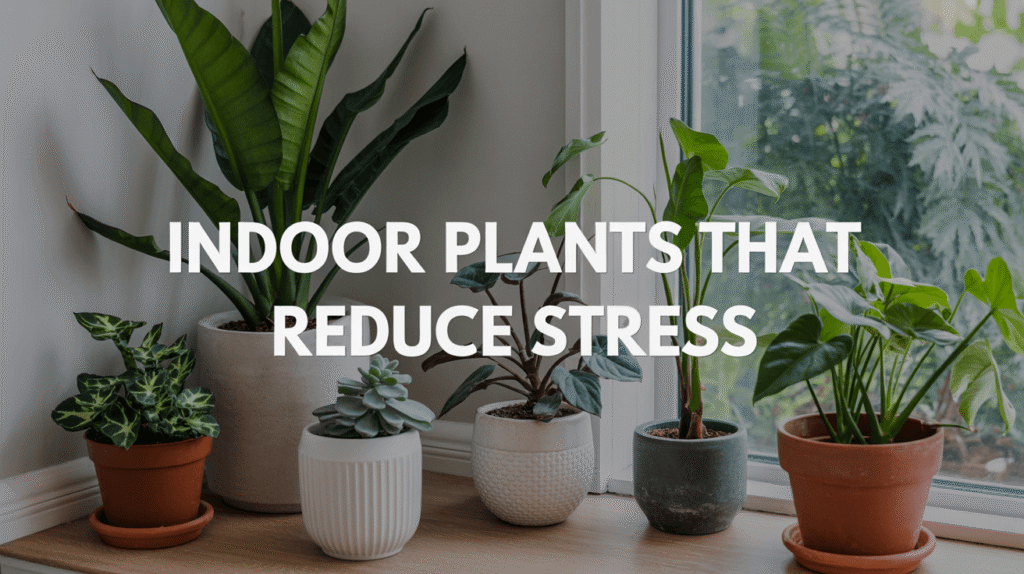In today’s fast-paced world, stress seems unavoidable. Work deadlines, constant notifications, and daily responsibilities can leave us feeling overwhelmed. But what if the solution to a calmer, more focused mind was as simple as adding a few indoor plants to your home or office? 🌱
Indoor plants don’t just beautify your living space—they improve mood, reduce stress, and promote mental well-being. Studies show that interacting with plants, even passively, lowers cortisol levels, decreases anxiety, and enhances concentration.
In this guide, we’ll explore the best indoor plants that reduce stress, practical care tips, and ways to incorporate them into your environment to create a relaxing green sanctuary.
Why Indoor Plants Reduce Stress
Plants impact our mental health in several ways:
- 🌿 Air Purification – Cleaner air leads to better breathing and reduced fatigue.
- 💚 Natural Connection – Caring for plants creates a sense of purpose and mindfulness.
- 🌸 Visual Calm – Green foliage and flowers reduce tension and create a soothing environment.
- 🧘♀️ Sensory Therapy – Touching, watering, and smelling plants can lower heart rate and blood pressure.
Top Indoor Plants That Reduce Stress
Here’s a list of the most effective stress-reducing indoor plants:
🌿 1. Aloe Vera
- Known for its air-purifying qualities and healing properties.
- Improves indoor air quality, which reduces stress and fatigue.
- Low-maintenance succulent—ideal for beginners.
🌱 2. Snake Plant (Sansevieria)
- One of the best air-purifying plants.
- Releases oxygen at night, promoting better sleep.
- Resilient and easy to care for.
🌸 3. Peace Lily (Spathiphyllum)
- Beautiful white blooms brighten your space and purify air.
- Helps remove toxins like formaldehyde and benzene.
- Requires minimal sunlight, making it perfect for offices.
🌿 4. Lavender
- Famous for its calming fragrance that reduces anxiety.
- Improves sleep quality when placed in bedrooms.
- Ideal for pots or small indoor gardens.
🌱 5. Bamboo Palm
- Hardy plant that thrives indoors.
- Improves humidity and filters air toxins.
- Brings a tropical, calming vibe to any room.
🌿 6. English Ivy
- Excellent for reducing airborne mold and allergens.
- Helps create a healthier environment, which indirectly reduces stress.
- Can be grown in pots, hanging baskets, or as a climber.
🌸 7. Gerbera Daisy
- Bright, colorful flowers enhance mood.
- Known for its air-purifying qualities.
- Perfect for sunny windowsills.
🌿 8. Jasmine
- Fragrant flowers promote relaxation and reduce anxiety.
- Enhances sleep quality.
- Thrives in bright, indirect sunlight.
🌱 9. Rubber Plant (Ficus elastica)
- Sturdy indoor plant that improves indoor air quality.
- Large glossy leaves create a calming green presence.
- Thrives in moderate sunlight and minimal care.
🌸 10. Golden Pothos
- Easy-to-grow trailing plant that reduces indoor pollutants.
- Its cascading vines create a soothing visual effect.
- Perfect for desks, shelves, or hanging baskets.
Tips for Using Indoor Plants to Reduce Stress
1. Place Plants in High-Stress Areas
- Keep plants near workstations, study desks, or living rooms.
- Visual contact with greenery improves focus and reduces tension.
2. Combine Visual and Aromatic Therapy
- Include fragrant plants like lavender, jasmine, or rosemary.
- The scent of these plants has proven stress-relief effects.
3. Use Planters That Inspire Calm
- Choose neutral or pastel-colored pots for a soothing aesthetic.
- Avoid cluttered arrangements—space and simplicity reduce stress.
4. Care as a Mindfulness Practice
- Watering, pruning, and observing plants can be a form of meditation.
- Engage senses—touch, smell, and sight—to enhance relaxation.
5. Mix Foliage and Flowering Plants
- Green foliage provides a calming backdrop.
- Bright blooms uplift mood and energy levels.
How Indoor Plants Improve Productivity
- Studies show that workers with indoor plants are more focused and creative.
- Plants reduce mental fatigue and stress-induced errors.
- A calm workspace encourages longer, more efficient work periods.
Common Mistakes to Avoid
- ❌ Overwatering – Can lead to root rot and plant stress.
- ❌ Poor Lighting – Stress-reducing plants like peace lilies need some indirect sunlight.
- ❌ Clutter – Too many plants can overwhelm the space.
- ❌ Neglect – Dead or yellowing leaves can affect the calming vibe.
Step-by-Step Guide to Creating a Stress-Free Indoor Garden
- Identify Stress Zones – Workspaces, bedrooms, and living rooms.
- Select Plants – Choose a mix of air-purifying and aromatic plants.
- Arrange Strategically – Place taller plants in corners, trailing plants on shelves.
- Provide Adequate Light – Bright, indirect light for most indoor plants.
- Maintain Regular Care – Water, prune, and rotate plants for optimal growth.
- Engage Mindfully – Spend a few minutes daily observing or caring for your plants.
Benefits of Indoor Plants for Stress Relief
- 🌿 Reduces Anxiety & Depression – Natural greenery promotes a sense of calm.
- 🌸 Improves Mood – Flowers and foliage elevate emotions and positivity.
- 💧 Enhances Air Quality – Cleaner air reduces headaches and fatigue.
- 🧘♂️ Encourages Mindfulness – Caring for plants promotes focus and relaxation.
Frequently Asked Questions (FAQ)
1. Which indoor plants are best for stress relief?
Snake plant, peace lily, lavender, aloe vera, and golden pothos are highly effective.
2. Can indoor plants help with sleep?
Yes—plants like snake plant, lavender, and jasmine improve sleep quality.
3. How do I care for indoor plants with minimal effort?
Choose hardy plants like aloe vera, snake plant, and pothos. Water moderately and provide indirect sunlight.
4. Do flowering plants reduce stress more than foliage plants?
Both help—foliage plants provide visual calm, while flowering plants uplift mood.
5. Can I keep indoor plants in the office?
Absolutely! They improve focus, reduce stress, and create a more pleasant work environment.
Conclusion
Indoor plants are more than decorative items—they are natural stress-relievers, mood enhancers, and air purifiers. By carefully selecting and caring for plants that reduce stress, you can create a calming, rejuvenating environment at home or work.
🌿 Ready to transform your space into a green sanctuary? Explore more plant guides, care tips, and stress-relief plant ideas at Green Plant Zone—your ultimate resource for a healthier, happier indoor garden.

Hi, I’m the creator of Green Plant Zone, a space dedicated to plant lovers. I share tips on indoor and outdoor gardening, plant care guides, and eco-friendly living. My mission is to help you grow healthier, happier plants and bring more greenery into everyday life.
